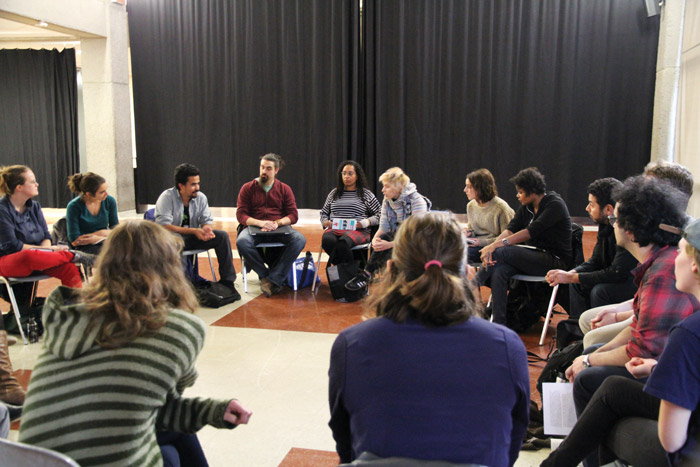Last Thursday, the Quebec Public Interest Research Group (QPIRG) McGill hosted a workshop on migrant workers in Canada as a part of Culture Shock, an annual event series put on by QPIRG that explores issues affecting immigrants, indigenous people, refugees, and people of colour. The panel of speakers included Viviana Medina from the Temporary Agency Workers Association (TAWA), Enrique Llanes from the Temporary Foreign Workers Association (TFWA), and Noe Arteaga, a former agricultural worker. The speakers shared their experiences as advocates and ex-temporary workers and explained the injustices currently faced by migrant workers in Canada.
Llanes talked about the history of migrant workers in Canada and the Temporary Foreign Worker Program, which was founded in 1973 and originally managed by the Department of Human Resources and Skills Development Canada. Today, non-governmental organizations (NGOs) and private employers run the program and, according to Llanes, negotiate workers’ salaries with the government without consulting the workers themselves.
“The employer has a myriad of rights over the worker, and the worker becomes a commodity, ” Llanes said.
Llanes also explained the role of the consumer in perpetuating the mistreatment of temporary foreign workers.
“Consumers put pressure on [the workers] as well […] to have the best fresh produce,” said Llanes. “This is not just in one industry. [The program] brings people from Guatemala to pick your tomatoes. It brings women from the Philippines to take care of your children. It brings people from Mexico to make your McDonald’s coffee [….] So it racializes the workforce and leaves it completely unprotected.”
Llanes also explained how colonialistic ideals still influenced the Temporary Foreign Worker Program.
“[The] program is intended to reproduce a worldwide inequality that is paramount to preserve the current economic model.” she said. “[It’s] based on the ideological and physical domination exerted by Western countries over the periphery.”
Noe Arteaga, who came to Canada from Guatemala through the Agricultural Foreign Worker Program, described his experiences as a temporary foreign worker on a farm in Québec. According to Arteaga, although the program was a government initiative, it was administered by an NGO that charged workers a $2,000 fee to join and imposed rules on the workers that forbade them to go to church, make Canadian friends, or unionize.
According to Arteaga, Canadian employers also often neglect the responsibility for the health of their temporary foreign workers. Foreign workers were made to work up to twice as many hours as local labourers. Arteaga highlighted an example of a worker who was told to exterminate pests on tomato crops.
“He didn’t have the proper equipment or training,” Arteaga said. “This worker got sick, and the employers didn’t care [….] so the worker kept working, but his health declined. When he started to get more aggressive toward the employers [in asking for medical attention], they locked him in the dining room.”
Medina spoke about worker placement agencies, which allocate 50,000 workers in Quebec each year, but are poorly regulated by the government. According to Medina, over 200 unregulated placement agencies exist in Québec and prey on temporary foreign workers.
“These workers have been here, on average, for four or five years,” Medina said. “They haven’t been able to achieve permanent jobs with [the company] itself. Because they’re working for the placement agency, and not for the actual employer where they work, the employment agency gets a percentage of their salary.”
The federal and provincial governments have recently passed laws that are detrimental for temporary foreign workers, Arteaga explained. The most recent example is Bill 8, passed this October in the National Assembly of Québec, which allows associations of temporary workers but forbids them to unionize.
Attendee Rachel Dénommé, a first-year master’s student in Integrated Studies in Education and Society, said the temporary foreign worker problem should also be examined in a broader context.
“It’s a multi-layered issue, and […] they’re talking about exploitation and lived realities here; but this is caused by globalization and colonization, and this is part of a much longer history,” she said.









